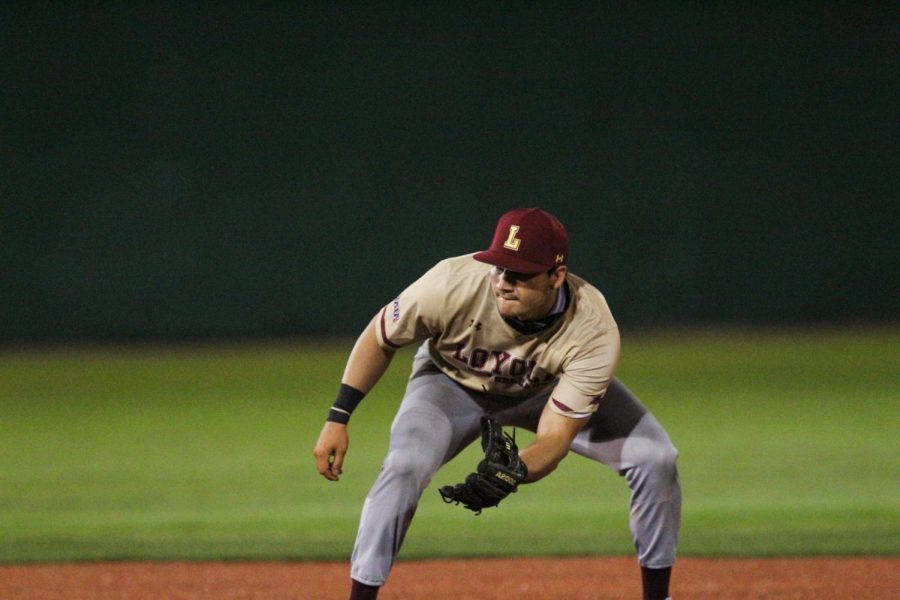Taking the heat
Outdoor athletes deal with the weather
Senior infielder Payton Alexander sets up to catch a baseball during practice last fall at Segnette Field in New Orleans, LA. Alexander said that hot weather is the best condition for most outdoor athletes to play in. Courtesy of Andrew Wellmann
March 24, 2022
New Orleanians are no stranger to rain and heat, but Loyola athletes who practice outdoors have an even deeper understanding.
That’s the case for Payton Alexander, senior baseball player. He said that while various sports may deal with the elements differently, outdoor athletes love the hot weather.
“I’m sure you ask anybody that plays an outdoor sport, hot weather is gonna be a lot more fun and a lot more enjoyable,” he said.
Christian Hanson, senior track and field distance runner, said that he doesn’t really notice the heat, whereas with cold weather your muscles get tight.
And it can get pretty hot, with Hanson saying the hottest day he ran was 96 degrees and feeling closer to 102 degrees.
“If you’re hydrated, it shouldn’t impact your running too much,” Hanson said. “If you’re not hydrated, you are going to get absolutely merked.”
Lucy Carpenter, a sophomore tennis player, shared similar sentiments about warm weather.
“You feel super loose,” she said, mimicking a tennis swing with her right hand. “If it’s cold, you really have to warm up so you don’t get injured.”
Humidity, unlike the heat, is a negative factor for Hanson.
“If it’s a day that’s clear like today, you can breathe,” he said. “If it’s humid, you feel like there is something in your lungs.”
Hanson is originally from Gainesville, Florida, where he was used to the hot and humid weather. One change he noticed coming to New Orleans, however, was the wind. Gainesville being farther from the coast, wind wasn’t as much of a factor as it is in New Orleans, he said.
“If you have a bad wind current coming in, it’s definitely going to impact how fast you run,” Hanson said.
Alexander said that wind is a huge factor for baseball as well, especially at Segnette Field on the Westbank where they practice and host games.
“It kind of changes our offensive approach whenever the wind’s blowing,” Alexander said. “Whenever the wind is blowing in, you can’t really hit home runs. You are hitting line drives to keep the ball close to the ground, but as the spring moves on the weather gets hotter.”
That is when the wind starts moving out and Alexander said they “let the balls fly.”
“Over the fall and early parts of the spring, Segnette is a really tough place to hit, but a good park for pitchers,” Alexander said. “Once it gets hot it shifts. It really puts the card in the hitter’s hand.“
Carpenter said that the biggest weather impact is rain. She said the team can’t play while it rains because college tennis play on hard courts.
“It gets really dangerous,” she said.
Hard courts, as opposed to clay courts, have lower energy consumption and therefore make the ball bounce higher and faster. They also get too slippery when wet for athletes to play on them.
When it comes to track and field, Hanson said anything short of a thunderstorm, and the team will still run.
Rain on the track does make it easier to slip, Hanson said, but since the runners have spikes on, that helps to keep traction. Spikes are shoes with tiny metal spikes at the bottom that dig into the track while running.
Alexander said that for baseball, a steady rain for too long, and they can’t play. He said the team had to stop playing due to rain during the national championships last year.
“It rained really hard one day and pushed the whole tournament back,” he said. “There were standing puddles of water all over the place. We had to get an industrial vacuum. We had to use some brooms to push some standing water off to the side. It took all 40 of us to get it done.”
At Segnette Field, they are lucky to have a turf infield, but since the outfield is grass, playing when it is too wet would destroy it, Alexander said. At least for these outdoor athletes, while rain may get in the way, Alexander reminded The Maroon that hot weather typically doesn’t.








